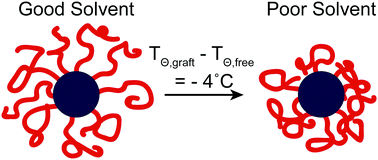Conformational change and suppression of the Θ-temperature for solutions of polymer-grafted nanoparticles†
Abstract
We determine the conformational change of polystyrene chains grafted to silica nanoparticles dispersed in deuterated cyclohexane using small-angle neutron scattering. The cyclohexane/polystyrene system exhibits an upper-critical solution temperature below which the system phase separates. By grafting the polystyrene chains to a nano-sized spherical silica particle, we observe a significant suppression in the Θ-temperature, decreasing from ≈38 °C for free polystyrene chains in d12-cyclohexane to ≈34 °C for the polystyrene-grafted nanoparticles. Above this temperature, the grafted chains are swollen and extended from the particle surface, resulting in well-dispersed grafted nanoparticles. Below this temperature, the grafted chains fully expel the solvent and collapse on the particle surface, destabilizing the nanoparticle suspension and leading to aggregation. We attribute the suppression of the Θ-temperature to a competition between entropic and enthalpic energies arising from the structure of the polymer-grafted nanoparticle in which the enthalpic terms appear to dominate.



 Please wait while we load your content...
Please wait while we load your content...
